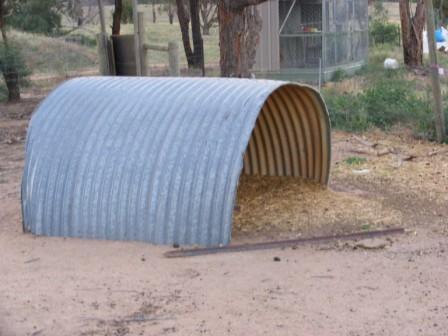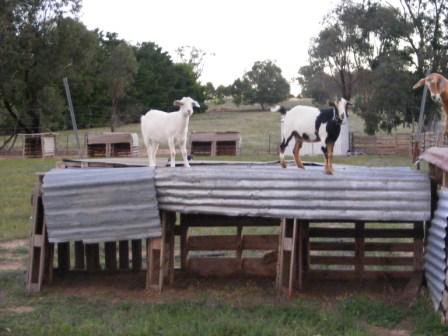Housing & Feeding & Fencing
Housing
I love to recycle! I believe if you can use it again go for it and that is why I have made my huts out of pallets and corrugated iron. The goats love being in them when cold or raining and sitting up on them to enjoy the view. These huts are simple to make using free pallets and there’s no way the wind is going to blow these away.
To make one hut you need 4 pallets - 3 for the sides and one for the roof. You can tie together using tie wire or screw them in. It is that simple that they can be made easy by one person. Half of an old tank works well also.
If you buy a goat you will need some shelter. Goats hate to get wet, the slightest drop of rain and they will run for cover. If you are only buying one for a pet a medium sized dog kennel is fine. You can add straw for extra warmth in winter. Goats love to be inside and on top of their huts!
Fencing
If you are starting with no fence and wondering what to do, here is my advice. Use netting (see picture below), as it saves you a whole lot of trouble later. I hand raise all my goats; it is extra work but all my goats are friendly which makes them easier to sell at any age as pets or breeding stock, so being quiet I don’t tend to have trouble with fence jumping. The average Miniature Goats don’t tend to jump fences. If you do get a jumper, an electric fence may be the answer. We made the mistake of using the tape instead of wire and I tell you now, don’t waste your money. The tape gets tangled, the wires inside break easy or short or burn out. The main use I have found for the tape is the goats love to scratch it between their horns.
Electric fences are great but again I have found if you have netting in the first place you probably don’t need to spend the extra on electric. In most of my paddocks I have hinge joint and yes it does work so if you are using hinge joint you may want to have electric fencing. NOT the babies as they are always trying to poke out of any fence to come to the house for a bottle so you do need netting with them.
I have one paddock I call my ‘naughty paddock’ and it is full netting. This is used majority of the time by the young ones and any girl that has popped through a fence. Time in the ‘naughty paddock’ with all the kids makes them go back to the other paddocks and not try to get out again!
Miniature Goats seem to pop through fences, (as they are small and smart), than go over them, so when setting up use netting(I use 109cm) and you will have less problems and save time and money.
I have used pallets as a large fenced area for my Does to come into when kidding. In that area, I have my dogs on wire runs to warn off foxes. Remember, these babies are tiny and easy prey for foxes. Foxes, of course, can get over this pallet fence but it provides some extra security feeling for the Does and if you have stock that are not easy to work with they make good, strong, high yards. I always lock up my Does and young Kids in sheds at night for safety until the kids are bigger and stronger at least 3mths.
Feeding
This is a big issue with all ages but mostly babies I find.
Goats are really arid animals and we bring them into areas of lovely green lush grass and think that they will do well.
When talking hay, like with horses, I find people get carried away in what they feed their animals, thinking that it has to be the best. This way of thinking is sometimes more for your own pride and ego than what is good for the welfare of the animals. Goats need simple feed like meadow grass hay or straw in their diet. Yes it does pay to check what’s in the hay as it may contain weeds not right for goats (so find out where it has come from and what weeds are in that area if you are not sure). Feeding Lucerne hay that is rich and green can cause more harm than good. I have a small Lucerne paddock that I let my animals in and out of , it is not pure Lucerne but has normal grasses mixed in, it does provide them with good protein as I feel the need to have them in there. I never leave animals in this area for long as even 2 hrs on pure Lucerne can cause bloat, sadly many farmers loose sheep quickly when they forget that rule. I don’t put my babies on it at all as I have found they scour pretty fast from Lucerne.
If milking I have found the Does milk taste absolutely off if eating lucerne. And it can cause blood in their milk so I don’t commend it. In saying all that I don’t want to scare people off Lucerne as I use it myself, it is very high in protein and really useful in their diets just be aware.
Now I am a big believer in saving money and so if I don’t have to feed hay etc. I don’t. It really depends on what stage your animals are at, what time of year it is and the conditions of my paddocks. If you are buying a goat to mow your lawn well you don’t want to be buying it feed so it doesn’t mow your lawn! If adult goats have no health issues and have a good supply of normal paddock grass then that’s fine. I try to get my animals to eat for themselves due to feed costs. I usually do a bit of dry feeding in spring and autumn as at those times the grasses are very watery and thins can cause stomach upsets to any animals as the amount of water goes straight through them. You have to look at the individuals and maybe take the ones out that need more dry feeding to a separate paddock which will save you feeding the rest.
Anyone buying Bottle Babies off me will be given good information on their diets and if they follow my advice they should have no problems. Babies and weaners need to have lots of thought put into they diets as while their stomachs are changing it can be a crucial time. Scours are a major issue and so I really recommend slow introduction of grass. To do this mine are on grass from the start but I make sure they have constant dry feed for them and they tend to eat more of this than the grass, this makes their grass intake not as much in those early times and as they age I give less dry feed until I know they can cope with the full green grass. How do they do it in the wild? Well they are not stuck in one paddock and can move from place to place and will more likely eat the dry types of grasses than the nice pasture we try to provide these days.
I use Cocci Drench (sulpher powder) whenever I see the need. I am not big on medication of anything but I will use cocci drench (available through vets usually in a large quantity about $60. so see if you can buy some off somebody as you will never use it all).It works wonders on animals with stomach issues and is safe for babies with sours or cocidiosus which is the main killer of babies. For more info on this product ask me I have seen it save many animals quickly.
Of course worm your goats but not as much as you would sheep or horses or others as they will build up a resistance to drenches and for that reason you need to change from a white drench to a clear drench at times. I tend to work with the seasons as far as when to drench or if I bring in a new animal as changes of pastures can let worms in. I believe the best drench on the market is QDrench and I use it seasonally and so far have not found a resistance build up. I recommend 6 in 1 vacc.
Also like children, goats get lice, so be aware and if you see bits of wool looking like its pulled out or they are scratching more than normal or looking a bit rough in general then check for lice. These are tiny little specks near the skin (can look like dirt) and they suck on these healthy animals and make them sick over time so get a simple lice spray suitable for goats and they will be clear in no time. Mostly spring and autumn, but always be aware and not embarrassed.




